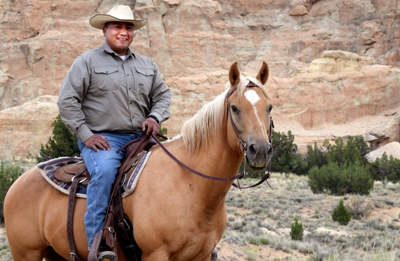 Acoma farmer and rancher Gilbert Louis III, with his horse, Johnny Cash, loves carrying on his tribe's and family's tradition of ranching. Louis is serving on the U.S. Department of Agriculture Council for Native American Farming and Ranching. He is a participant in the New Mexico Pueblo Beginning Farmers and Ranchers Program conducted by the New Mexico State University College of Agricultural, Consumer and Environmental Sciences' Rural Agricultural Improvement and Public Affairs Project.
Acoma farmer and rancher Gilbert Louis III, with his horse, Johnny Cash, loves carrying on his tribe's and family's tradition of ranching. Louis is serving on the U.S. Department of Agriculture Council for Native American Farming and Ranching. He is a participant in the New Mexico Pueblo Beginning Farmers and Ranchers Program conducted by the New Mexico State University College of Agricultural, Consumer and Environmental Sciences' Rural Agricultural Improvement and Public Affairs Project.
(NMSU photo by Jane Moorman)WRITER: Jane Moorman, 505-249-0527, jmoorman@nmsu.edu
ACOMA – Gilbert Louis III considers himself a hybrid. The Native American respects and cherishes his tribal traditions, yet knows there is value in adapting to the modern ways.
"I'm in the generation that is taking the old and seeing the value of the new and blending it together," said the Acoma rancher and firefighter for Albuquerque Fire Department. "I tell my son, you have to be a hybrid to be successful."
Agriculture is a way of life his people have practiced for centuries. The traditional ways of planting crops and raising livestock have been passed down from generation to generation.
"There's a lot of pride in that tradition. There is conflict of the new ideas and practices with the way grandpa or dad did it, which many say are still working," he said. "It is sometimes easier to do it the old way, but we need to produce what the industry needs if we are going to be competitive in the market place."
Louis is participating in the New Mexico Pueblo Beginning Farmers and Ranchers Program conducted by New Mexico State University's College of Agricultural, Consumer and Environmental Sciences.
Since 2013, the NMSU Cooperative Extension Service's Rural Agricultural Improvement and Public Affairs Project has introduced 150 pueblo farmers and ranchers with less than 10 years of farming experience to modern, research-based information to improve their agricultural operations.
The program is funded through a U.S. Department of Agriculture National Institute of Food and Agriculture Beginning Farmer, Rancher and Veteran grant.
"The program brings conferences and opportunities to the tribe and others in the area," Louis said. "It gives us a chance to travel to other pueblos and agricultural producers to see what they are doing. The main thing is that we are getting up to date."
Through adopting things taught in the program, such as Beef Quality Assurance practices, Louis and his father, Gilbert Louis Jr., have improved the quality of their cattle herd and are now receiving better prices when they sell their livestock.
"I remember in the past my dad calling my uncle with the latest prices and agreeing to take some cattle to sell," he said. "Last year our family ranch finally sold our cattle directly to Labatt Food Services' Native American Beef Program and we got a nice price."
New Mexico Pueblo Beginning Farmers and Ranchers Program participants also are accessing U.S. Department of Agriculture programs. The collaboration of USDA Farm Service Agency and NMSU's RAIPAP have brought the agency to the people during workshops to help the farmers and ranchers apply for programs.
"We are doing a lot of upgrades on our ranch, such as converting our windmills to solar power wells, putting in cross fencing, putting in water lines, thinning trees," he said. "We have obtained loans through FSA for some of these projects."
This access has not been easy for some Native Americans in the United States. The Council for Native American Farming and Ranching, established as part of the Keepseagle class action suit settlement, advises the U.S. Secretary of Agriculture on ways to eliminate barriers to Native American farmers and ranchers' participation in USDA programs.
In December 2016, then Secretary of Agriculture Tom Vilsack appointed Louis to a two-year term on the 15-member council. Knowing how to blend the traditional ways with modern opportunities will help Louis while on the council.
"It was amazing the various issues being discussed at our first meeting," Louis said. "Different regions have different issues. There were many issues I didn't know about. For the most part these issues don't pertain to us. Because of the collaboration of NMSU's Beginning Farmers and Ranchers Program and USDA agencies, we are light years ahead of other states."


